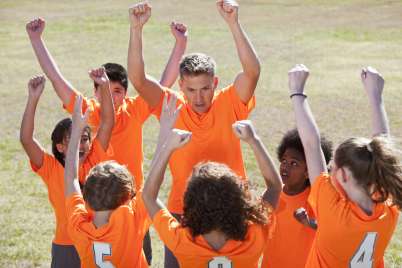
This professional coach wants to help parents who scream in the stands
At the start of the school year, an article in the Journal de Montréal got people talking. It was about the impact of unruly parents at schools and in sports. Coaches, officials, sports club managers, and children were all ranting about how parents rule the roost everywhere they go.
We found this paragraph particularly compelling:
They make the referees cry, they yell at kids who miss the net, and they harass the coaches. They aren’t happy just calling the shots at school: they also take over the stands at their children’s sports events.
Is it true? Are parents going too far? Or are they being judged too harshly? We wanted to find out for ourselves, so we spoke with André Lachance. He’s the operations manager for Baseball Canada and the head coach of the National Women’s Team, but he’s also the father of active kids. We asked André about the fallout from the article and the strong reactions it elicited on social media.
What did you think of the article? Does it reflect reality?
As a parent, I’ve frequently come across these types of mothers and fathers in the stands and on the sidelines. The kind who don’t hold back from yelling out and berating the coaches, officials, and children.
As a coach however I ask myself this: Are we being too quick to judge these parents? Have we taken the time to explain the rules of the game, the objectives the coaches have set for their kids, the key role the coach plays in skill development, and the officials’ responsibilities during the game?
Without hesitation, my answer is, “No”.
Our natural reflex is to blame the parents in the stands. I’m not trying to justify the deviant behaviour of some, but I firmly believe that we need to be more proactive in finding solutions instead of just dealing with the fallout.
I coach the National Women’s Team, and I’ve coached at every level of organized baseball. I also coached my kids’ soccer teams at the local and regional levels. On several occasions, I’ve used a few tricks that have proven to be extremely effective in getting parents to work with – instead of against – the coaches and the sport.
Here are a few ideas:
- Organize a parents’ meeting at the start of the season to explain the objectives and skills that will be worked on based on the specific stage of athlete development and maturity level, and educate them on the long-term development of athletes and the basic rules of the game. In short, expose the parents to the coach’s general philosophy. This parents’ meeting is crucial.
- Prepare a code of conduct for parents, coaches, officials, and players to sign. You can always issue reminders along the way.
- During practices, let your assistant coaches lead the session, and spend time in the stands with the parents. Explain what’s going on and what the objectives are. You’ll be amazed at how quickly the criticism dies down.
- A few years ago in the United States, a soccer association introduced “Silent Sundays,” where parents were invited to attend, but were required to stay silent during their children’s scheduled practice or game. The players said it was their favourite day of the week.
- Create a parent-free zone, for instance near the players’ bench.
- Introduce the referees to the spectators before the game: first name, age, what they love about the sport, etc. We sometimes forget that the official is a young person with little experience. Like all the children during the game, the official will also make mistakes.
What would you like to tell parents to encourage them to be part of the solution?
Have fun at your children’s practices and games.
Trust the coaches and officials who are working with your children. In most cases, they have received adequate training and are qualified to do their jobs. Canada arguably has one of the best coach training systems in the world.
If your children’s coaches have not taken steps to explain the team objectives to you, take the initiative and arrange a parents’ meeting to support them. Back them in their decisions.
Keep in mind the fact that the main purpose of sport is to keep your children active while at the same time allowing them to develop a wide range of movement skills they will be able to confidently use in other situations and environments throughout their lives.





